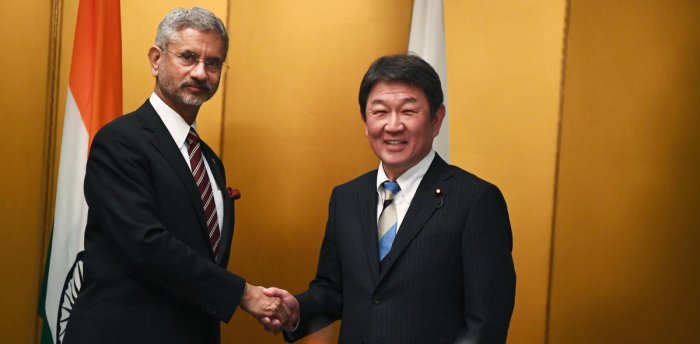New Delhi: India and Japan have finalised an ambitious agreement that provides for cooperation in 5G technology, artificial intelligence and an array of other critical areas as the two strategic partners vowed to further broadbase their ties including in the Indo-Pacific region. The pacts are aimed at curtailing the dominance that Chinese technology and products enjoys in India.
The pacts were signed after a meeting between External Affairs Minister S Jaishankar and his Japanese counterpart Toshimitsu Motegi here Wednesday. It was announced that Japan agreed to be the lead partner in the connectivity pillar of the Indo-Pacific Oceans’ Initiative (IPOI).
The IPOI is an India-backed framework aimed at making meaningful efforts to create a safe and secure maritime domain in the Indo-Pacific, a region where China has been expanding its military assertiveness triggering global concerns.
Jaishankar, in a tweet, said further expansion of India-Japan collaboration in third countries with focus on development projects also figured in the 13th India-Japan foreign ministers’ strategic dialogue.
“Recognising the increasing role being played by digital technologies, the two ministers highlighted the need for robust and resilient digital and cyber systems and in this context, welcomed the finalisation of the text of the cybersecurity agreement,” the Ministry of External Affairs (MEA) said.
“The agreement promotes cooperation in capacity building, research and development, security and resilience in the areas of Critical Information Infrastructure, 5G, Internet of Things (IoT), Artificial Intelligence (AI), among others,” it added.
The cooperation between India and Japan on 5G technology comes in the backdrop of growing reluctance by a significant number of countries globally to allow Chinese telecommunications giant Huawei to roll out 5G services in their territories.
The US has already banned Huawei over concerns of security, and Washington has been pressuring other countries to restrict the operations of the Chinese telecom major.
The 5G is the next-generation cellular technology with download speeds stated to be 10 to 100 times faster than the current 4G LTE networks.
In their talks, Jaishankar and Motegi deliberated on a broad range of areas including maritime security, trade and investment, manufacturing, connectivity and infrastructure and reform of the United Nations, the MEA said.
“They emphasised that a free, open and inclusive Indo-Pacific region must be premised on diversified and resilient supply chains; and in this context, welcomed the Supply Chain Resilience Initiative between India, Japan, Australia and other like-minded countries,” the MEA said.
It said the two ministers also concurred that the Indo-Pacific has acquired greater salience in recent times and underscored the need for India and Japan to work together for the benefit of the region.
“Reaffirming the similarities in their respective Indo-Pacific visions that are based on rule of law and respect for sovereignty and territorial integrity, the Japanese side agreed to be the lead partner in the connectivity pillar of the Indo-Pacific Oceans’ Initiative and jointly take both countries’ respective visions for the Indo-Pacific forward,” the MEA informed.
At the East Asia Summit in Bangkok last year, Prime Minister Narendra Modi proposed setting up of the Indo-Pacific Ocean’s initiative to conserve and sustainably use the maritime domain and to make meaningful efforts to create a safe and secure maritime domain.
In the talks, the two ministers exchanged views on regional and global issues of mutual interest and agreed that the strong and enduring partnership between the two countries will play a pivotal role in overcoming challenges posed by the COVID-19, the MEA said.
